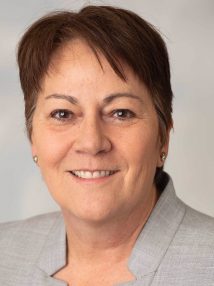Welcome to Texas Geosciences, from Dean Claudia Mora
September 16, 2021
Friends,

A new fall semester has started, and it is fantastic to see students back in classrooms and labs after a year and a half of mostly remote learning. The 55 faculty members, 200 researchers and 400 students at the Jackson School of Geosciences did an amazing job of overcoming the challenges of virtual science, round-the-clock lab cohorts, field camps that required isolation and testing, and all the other weirdness driven by the pandemic. It is great to see discovery in action again!
As news of the catastrophic impacts of Hurricane Ida, the California wildfires, and drought in the western states tops the headlines, there’s never been a more important time to be a geoscientist. This latest edition of “Texas Geosciences” is a collection of geoscience stories that illustrates our important role in tackling issues critical to society, as well as fundamental research and education.
Jackson School researchers are grappling with both the impacts of climate change and its mitigation. In one study reported here, researchers are examining which metrics are most important when it comes to determining climate change’s impact on the water supply of California. Another study describes how Texas has the makings of a carbon storage hub.
At the same time, Jackson School scientists are advancing fundamental earth knowledge. This includes revising the age of the Earth’s core, and discovering an overlooked source of CO2 emitted by fractured bedrock in forests.
Getting students into the field continues to be one of our top priorities, and I am happy to report we ran all three of our summer field camps this year without a hitch! Hydrogeology camp students tested their ability to predict groundwater flow at our White Ranch research center, students in our Marine Geology and Geophysics camp deployed chirp sonar in the Gulf, and two sections of our capstone course mapped geological highlights from New Mexico to Wyoming.
Researchers at the Jackson School are increasingly integrating advanced computation and simulation into their research. You can read a story about one of our newest hires, Dunyu Liu, a geophysicist and computational scientist, who is helping other Jackson School scientists access and take advantage of the Texas Advanced Computing Center here on campus.
It is with pride that we are able to bring to light the professional accomplishments of Professor Ian Dalziel, the 2021 winner of GSA’s Penrose Medal. We welcome you to learn more about his scientific career and contributions to tectonics research.
And finally, the Jackson School is happy to announce the re-start of its Distinguished Postdoctoral Fellows Program, a wonderful opportunity for young scientific talent to leverage the deep intellectual resources of the Jackson School! Please help us spread the word about this opportunity.
Personally, I am so happy to reconnect with the academic geoscience community after a dozen years in the national lab system, and I welcome your comments, ideas, and conversation! In the meantime, please pass along “Texas Geosciences” to anyone you think would be interested in learning more about the research and education happening across our school.
Sincerely,
Claudia Mora, Dean
